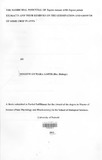| dc.description.abstract | The study was conducted to determine the herbicidal effect of Tagetes patula and Tagetes
minuta on the germination and seedling growth of Eleusine coracana, Rorripa indica,
Capsicumfrutescens and Phaseolus vulgaris. Seeds of T patula and T minuta were
planted on two plots and the seedlings harvested after attaining the height of7-1O ems.
Extracts of water, methanol and thiophenes were obtained from the roots and leaves of
the dried samples of T minuta and T patula. Test plant seeds of Eleusine coracana,
Rorripa indica, Capsicumfrutescens and Phaseolus vulgaris were subjected to three
levels of extract concentration; 20%, 40% and 60% in a completely randomized block
design with each replicated three times. The biological activities of these extracts were
assessed by examining the reduction in mean germination percentage and the subsequent
delay of germination time. Root length, shoot and leaf area were measured to determine
the suppression effect of Tagetes extracts on the growth of seedlings of the test plants.
The SPSS package was used to analyze the data collected in which analysis of variance
and post hoc test using LSD were carried out to explore the impact of each extract on the
germination percentage, delay and on seedling growth. The results showed a significant
decrease at p<0.05 in the mean germination percentage, germination time, root and shoot
length. The magnitude of germination inhibition was shown to be proportional to the
extract concentration. Germination inhibition and seedling growth suppression was great
in the residue, water and methanol treatment compared to thiophene. Roots of the test
plants were shown to be the most affected by the extracts, followed by the shoot length,
though the leaf area was non significantly affected (p>0.05). The sensitivity to these
extracts varied among the test plants with R. indica showing the lowest mean germination
percentage in all treatment, however, the mean germination time depended highly on the
concentration of the extract. The test plants C.frutescens, E. coracana and P. vulgaris
similarlyregistered a decline in mean germination percentage and an average delay on
the germination of the seeds. Therefore, the residues and the crude extracts of water and
methanol did show significant reduction effect on the germination and the growth of the
seedlings. | en |

